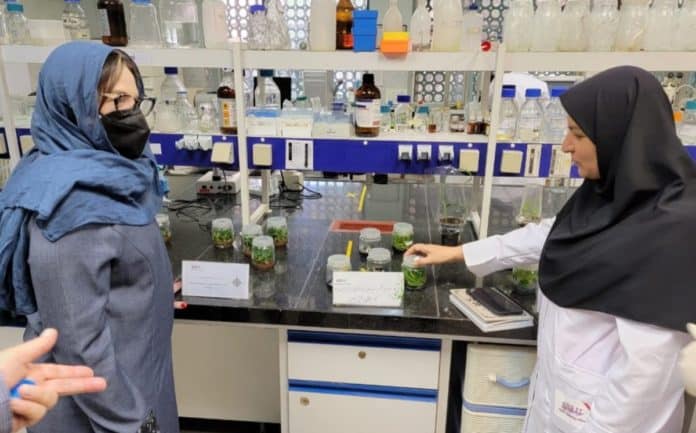
Two female researchers at the Agricultural Biotechnology Institute of Iran. Photo: @Gabrielasjr.

Orinoco Tribune – News and opinion pieces about Venezuela and beyond
From Venezuela and made by Venezuelan Chavistas

Two female researchers at the Agricultural Biotechnology Institute of Iran. Photo: @Gabrielasjr.
On Monday, Venezuela and Iran shared their experiences in food production during Minister of Science and Technology Gabriela Jiménez’s visit to the Iranian Agricultural Biotechnology Institute.
Minister Jiménez publicized her trip via Twitter, noting how “at the Agricultural Biotechnology Institute of the Islamic Republic of Iran, we shared experiences about the contribution of female scientists to the sovereign production of food for our peoples.”
RELATED CONTENT: Venezuela’s Special Economic Zones Law: What It Is & What It Is Not
Likewise, she touched on the union between both countries, and their love of science “which places life above capital.”
En el Instituto de Biotecnología Agrícola de la República Islámica de Irán, compartimos experiencias y el aporte de las #MujeresCientíficas en la producción soberana de alimentos para los pueblos.
Nos une el amor por una ciencia que coloque la vida por encima del capital. pic.twitter.com/wYD5vIB9kd
— Gabriela Jiménez (@Gabrielasjr) August 1, 2022
The development of nanofertilizers
Minister Jiménez also explained how “researchers from the Institute of Agricultural Biotechnology of Iran are developing nanofertilizers, as well as nanobiosensors to detect contaminations in different systems.”
Nanofertilizers and nanobiosensors allow agricultural producers to ensure food safety, and to detect contamination in water and soil.
En el Instituto de Biotecnología Agrícola de la República Islámica de Irán, compartimos experiencias y el aporte de las #MujeresCientíficas en la producción soberana de alimentos para los pueblos.
Nos une el amor por una ciencia que coloque la vida por encima del capital. pic.twitter.com/wYD5vIB9kd
— Gabriela Jiménez (@Gabrielasjr) August 1, 2022
Venezuela and Iran: one million hectares
On July 26, Iran’s Deputy Minister of Interior for Economic Affairs Mohsen Kushki Tabar noted that the agricultural agreement between Venezuela and Iran will provide the latter with one million hectares for growing food.
The agricultural agreement is part of a 20-year cooperation agreement that was signed in June when the president of Venezuela, Nicolás Maduro, visited Tehran and met with his Iranian counterpart, Ebrahim Raisi.
RELATED CONTENT: Venezuela’s Paraguaná Refinery Starts Operation with Iranian Crude
In this regard, Tabar has commented on how this agreement, made in the midst of a crisis of strategic food reserves throughout the world, demonstrates that “Iran has reached a level of knowledge exchange that other countries seek out.”
The Bolivarian Republic of Venezuela and the Islamic Republic of Iran maintain a close cooperative relationship with the aim of developing common projects in various areas, and promoting the welfare of their peoples.
(Últimas Noticias) by Janna Corredor with Orinoco Tribune Content
Translation: Orinoco Tribune
OT/KW/SL